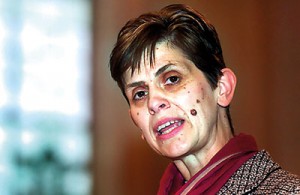Sunday Times 2
Reverend Libby named first female bishop
View(s):Reverend Libby Lane has been announced as the first female bishop for the Church of England, just a month after a historic change to canon law.
She will become the new Bishop of Stockport, a post that has been vacant since May.
Mrs Lane has been the vicar at St Peter’s Hale and St Elizabeth’s Ashley, in the diocese of Chester, since 2007.

Reverend Libby Lane. AFP
The general synod voted to back plans for female bishops in July and formally adopted legislation on 17 November. The appointment will end centuries of male leadership of the Church and comes 20 years after women became priests.
Mrs Lane was ordained a deacon in 1993 and a priest in 1994, serving her curacy in Blackburn, Lancashire. Since 2010 she has also held the role of Dean of Women in Ministry for the diocese of Chester. After being schooled in Manchester and then the University at Oxford, she trained for ministry at Cranmer Hall in Durham, according to her church’s website.
Her husband George – a chaplain at Manchester Airport – is also a priest, and they were one of the first married couples in the Church of England to be ordained together.
Her church website also said that her interests included being a school governor, supporting Manchester United and learning to play the saxophone.
Before she gave her acceptance speech Mrs Lane asked the audience at the press conference to stand for a prayer in memory of the schoolchildren who lost their lives in a Taliban attack in Pakistan on Tuesday. She said: “It is a remarkable day for me and an historic day for the Church.”
She added that she was honoured and thankful to be chosen for the appointment. Prime Minister David Cameron tweeted: “Congratulations to Revd Libby Lane on becoming the first woman bishop in the Church. An historic appointment and important day for equality.” The first women priests were ordained in 1994, but to date women have not been able to take on the Church’s most senior roles.
Legislation to fast track women bishops into the House Of Lords will be introduced to Parliament on Thursday.
But Mrs Lane will not be able to enter the House of Lords as the post is a junior or suffragan appointment within the Diocese of Chester, the BBC’s religious correspondent Caroline Wyatt said.
The first women bishop eligible to take up a seat in the Lords is expected to be announced in the new year. Interviews for the vacancy as bishop for the Southwell and Nottingham diocese took place at the start of December. Gloucester, Oxford and Newcastle are also among the dioceses where new bishops will also soon be appointed.
The general synod, the Church’s law-making body, gave the final seal of approval to the legislation on women bishops after it passed through Parliament in October.
After the change was approved, the Archbishop of Canterbury Justin Welby said it was the start of “a new way of being the church” and that it was entering into a “completely new phase of our existence”. “It has taken a very, very long time and the way is now open to select people for the episcopacy, to nominate them on the basis simply of our sense that they are called by God to be in that position without qualification as to their gender,” he said.
But divisions still remain in the church between Anglicans who feel the change is consistent with their faith and traditionalists who disagree.
The previous Bishop of Stockport has already said he was “looking forward” to women being ordained Church of England bishops. The Right Reverend Robert Attwell made his comments in January after being selected as the next Bishop of Exeter. The path to the Church appointing female bishops has taken many years. One of the first crucial steps came in 1975 when the general synod voted that there was “no fundamental objection” to the ordination of women to the priesthood, but it did not pass a second motion asking for the legal barriers to women’s ordination to be removed.
In 1985, a vote allowed women to become deacons, and in 1992 women were officially permitted to be ordained in the priesthood, but the first women priests were not announced until two years later.
In November 2012, the vote to allow female bishops failed by six votes in the House of Laity. At the time the then Archbishop of Canterbury Rowan Williams said that particular vote had cost the Church “a measure of credibility”.
But in July, the House of Laity voted 152 in favour of the motion, with 45 against, and five abstentions.
Churches in Scotland, Wales and Northern Ireland already allow women as bishops, but haven’t appointed one yet.
Courtesy BBC

